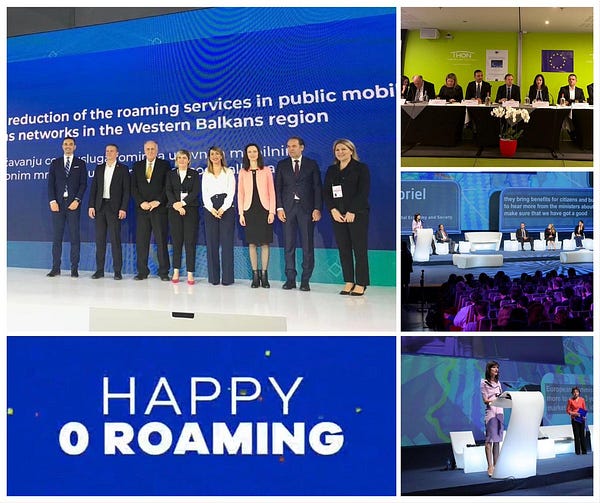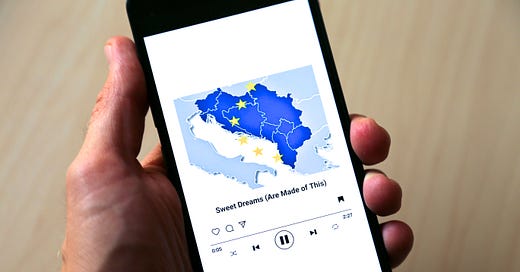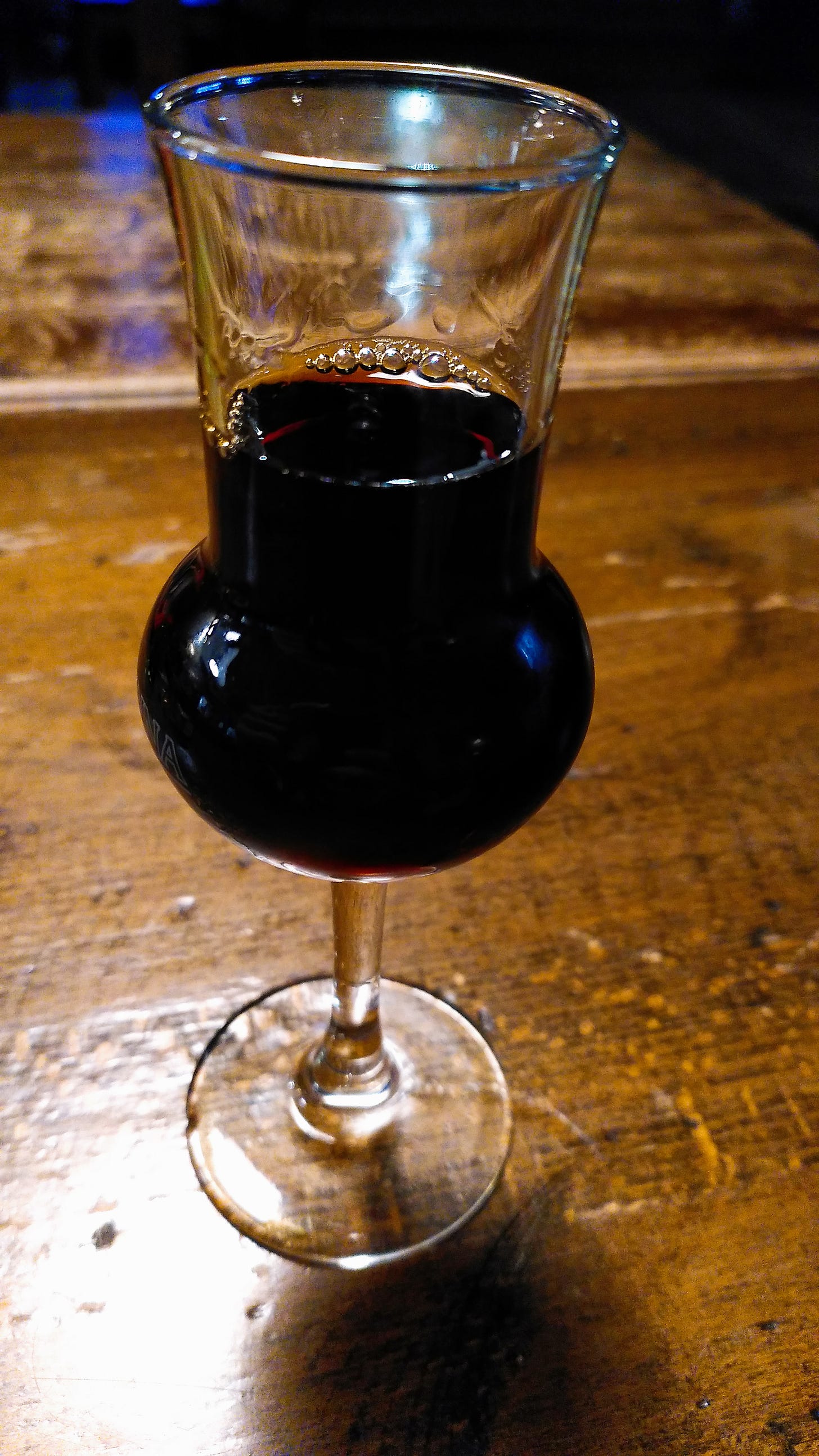S2E10. The Western Balkan Union
Brussels has opened the door to reducing roaming costs between the EU and the Balkans. But the region has already started its own process of breaking down barriers to connectivity and free movement
Hi,
welcome back to BarBalkans, the newsletter with blurred boundaries.
One of the most curious things that came out of the EU-Western Balkans Summit last 6 October (we did an in-depth analysis last week) found space in section 16 of the Brdo Declaration:
«We welcome the roadmap for roaming, which will create the conditions and set clear targets for lowering roaming costs between the EU and the Western Balkans».
This is curious just because it was presented as a success by the Slovenian Prime Minister and President of the Council of the European Union, Janez Janša.
Actually, Brussels is also late on breaking down roaming barriers with the six Western Balkan countries.
Think about it. This is a problem that may affect any European citizen.
If you live in the EU and want to travel to Tirana, Sarajevo, Pristina, Podgorica, Skopje or Belgrade, you have to pay an additional fee whenever you use your smartphone.
The same does not happen if you are in Paris, Madrid, Berlin, or any other city within the European Union.
Albania, Bosnia and Herzegovina, Kosovo, Montenegro, North Macedonia and Serbia have long been asking the 27 EU Member States to open at least this door.
Perhaps, now is the time.
Meanwhile, the Western Balkans have wasted no time.
Enable roaming
Roaming is used by mobile phone operators to allow users to connect abroad, using another network and paying a fee to the foreign operator.
However, the institutions of different countries can reach an agreement to eliminate the costs for data roaming.
In the European Union, this historic step in connectivity was taken in the summer of 2017, when millions of citizens touched the process of European integration.
The agreement was initially conceived as temporary, expiring on June 30, 2022. A sort of trial period, which the EU Commission proposed to extend for another 10 years.
In this process (and in its updating) non-EU countries have been left out, including the six Balkan countries. But they have decided to organize themselves independently.
It took two years, but today free roaming Union is a reality.
Since July 1, Albanian, Bosnian, Kosovar, Macedonian, Montenegrin and Serbian citizens can use their smartphones anywhere in the region (except in the two EU countries, Croatia and Slovenia) just like at home.
The roaming abolition strategy was officially launched at the Western Balkans Digital Summit in Belgrade in 2019, with the signing of a 27% tariff reduction agreement.
The agreement was implemented gradually, with the target of zero roaming for the nearly 18 million citizens by July 1, 2021.
Cutting costs brings a double benefit. On one hand, it encourages the exchange of contacts and information in everyday life. On the other hand, it pushes economic and trade cooperation.
When we talk of “integration” as an abstract concept, this kind of agreement immediately shows everyone the tangible advantages of opening up to other countries.
The European Commissioner for Innovation, Mariya Gabriel, expressed her satisfaction, underling that this agreement will have an extremely positive impact.
In Brussels it is seen as the first step on the road to regional cooperation, which is an essential condition for the enlargement of the EU in the Western Balkans.
At the same time, Balkan citizens hope to enable data roaming for free also in the other European countries, without the need to wait for developments on the uneven path towards EU accession.
And EU citizens would like to do the same, when they travel in the only wormhole of free roaming in Europe.


Travel across borders
One of the most well known features of the European Union (and beyond) is the abolition of internal border controls.
The Schengen Area (named after the town in Luxembourg where the agreements were signed from 1985 onwards) comprises 26 countries: 22 EU Member States (4 will join it, only Ireland is out), plus Switzerland, Norway, Lichtenstein and Iceland.
As EU citizens know, this is an area where the free movement of people, goods, services and capital is guaranteed, and where passports and all kind of border controls are abolished.
Needless to say, the Western Balkans are the wormhole of the Schengen Area, surrounded by countries that are already participating (Greece, Slovenia and Hungary) and others that are committed by treaty to join (Croatia, Bulgaria and Romania).
Considering the uncertain timetable of the EU enlargement process, some leaders of the region wanted to show Brussels that the Balkan countries have the capacity to join the European Single Market.
This is why, on July 29, the heads of State and government of Albania, North Macedonia and Serbia signed the Open Balkan agreement in Skopje.
The aim is to create a free trade area based on the four freedoms of the Schengen Area, abolishing travel restrictions and facilitating work visas for Balkan citizens by 2023.
The Serbian President, Aleksandar Vučić, the Albanian Prime Minister, Edi Rama, and the Macedonian Prime Minister, Zoran Zaev, will meet again in Tirana and they hope that the other Balkan countries will join this free trade area.
Montenegro and Bosnia and Herzegovina have so far followed the meetings as observers, while Kosovo has first to normalize its relations with Serbia (we talked about it a few months ago).
Moreover, this initiative - launched in Novi Sad in October 2019 - changed the name few months ago: from Mini-Schengen to Open Balkan.
Open Balkan is the demonstration that the Western Balkans are able to organize themselves even without the “mentors” in the EU and that they are able to reject elements that have nothing to do with the region (such as the reference to Schengen, as they are excluded from this area).
All this, while waiting to finally share freedom of movement with the rest of Europe.
Pit stop. Sittin’ at the BarBalkans
We have reached the end of this piece of road.
There is another thing that unites all the Balkan countries: the alcoholic tradition.
From rakija to schnapps, from wines to beers, to-date almost everything has been put on our bar, the BarBalkans.
As we are talking about open borders, contamination and relations with the European Union, today I want to recommend you a liquor that is popular throughout the region.
I had the opportunity to taste it in Ljubljana, at the end of last week’s EU-Western Balkans Summit, in the extraordinary restaurant Sarajevo ‘84.
I'm talking about pelinkovac, a bitter liqueur based on absinthe wormwood.
It is the herb that gives the name to the liquor: in Serbo-Croatian, absinthe wormwood is called pelin.
It is also known as pelinkovec, pelinovec or, more simply, pelin.
Pelinkovac is popular from Bosnia to Slovenia, from North Macedonia to Montenegro, and in Croatia, where it probably reached the highest point of production.
Badel Pelinkovac label, founded in 1862, was enjoyed even in Paris, at the court of Napoleon III.
At a time when border wars were breaking out in the Old Continent, the Balkan absinthe-based liquor was already uniting European peoples.
Let’s continue the BarBalkans journey. We will meet again in a week, for the 11th stop.
A big hug and have a good journey!
BarBalkans is a free weekly newsletter. Behind these contents there is a lot of work undertaken.
If you want to help this project to improve, I kindly ask you to consider the possibility of donating. As a gift, every second Wednesday of the month you will receive a podcast with an article about the dissolution of Yugoslavia.
Every month you can listen to the preview of BarBalkans - Podcast on Spreaker and Spotify. The last episode was out on Wednesday, don’t miss it!
Pay attention! The first time you will receive the newsletter, it may go to spam, or to “Promotions Tab”, if you use Gmail. Just move it to “Inbox” and, on the top of the e-mail, flag the specific option to receive the next ones there.
As always, I thank you for getting this far with me. Here you can find all the previous newsletters.
BarBalkans is on Facebook, Twitter and Instagram. The updated archive is on Linktree.






